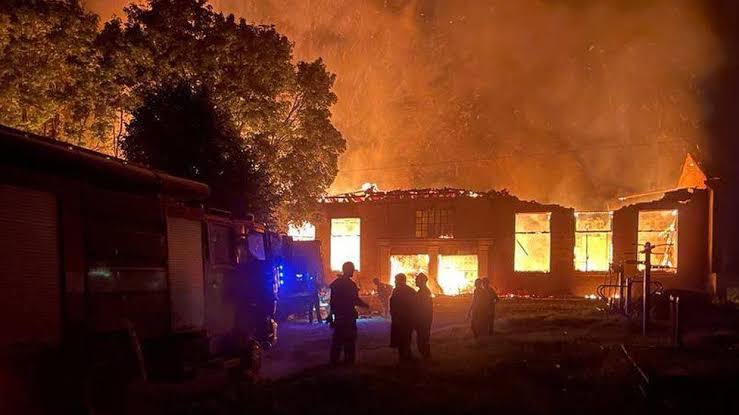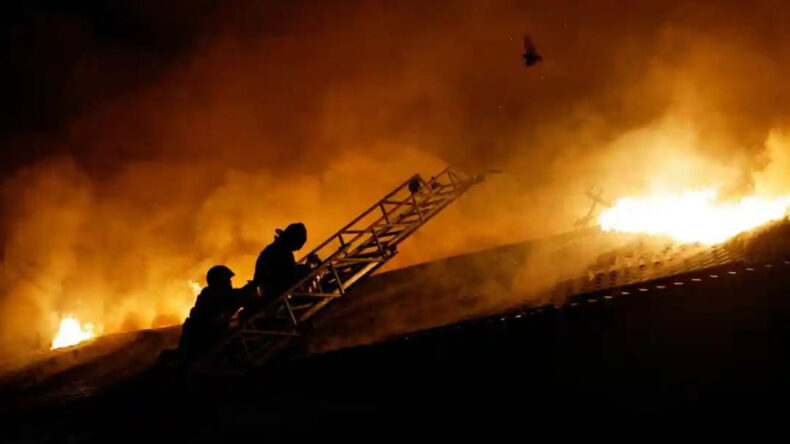
In a tragic turn of events, a blood transfusion centre, a university, and an aeronautics facility have been targeted in deadly air raids as tensions continue to escalate between Russia and Ukraine. These attacks, which occurred late on Saturday, follow a recent strike by Kyiv on a Russian tanker in the Black Sea, further fueling the hostilities between the two nations.
As the attacks unfolded, senior officials from around 40 countries, including global powers like China, India, and the United States, convened in Saudi Arabia for talks aimed at finding a resolution to the escalating conflict in Ukraine. However, a final declaration from the two-day meeting is not anticipated.
Ukrainian authorities swiftly pointed the finger at Russia for the devastating attack on a blood transfusion centre situated in the eastern town of Kupiansk. Ukrainian President Volodymyr Zelenskyy denounced the assault as a “war crime,” emphasising the loss of life and injuries sustained in the attack. The Russian forces reportedly utilized a “guided aerial bomb” in the assault, which led to a fire that rescue workers were battling to extinguish.
In response, the Moscow-installed officials accused Kyiv of using cluster munitions to target a university located in the Russian-controlled Donetsk region. The governor of Donetsk reported that a university building was engulfed in flames due to Ukrainian shelling, though these claims could not be independently verified.
The attacks on the blood centre and university were part of a broader series of strikes witnessed throughout the day. Notably, Russian forces targeted a Ukrainian aeronautics facility belonging to Motor Sich, a key manufacturer of plane and helicopter engines. This facility, located near Khmelnytskyi in western Ukraine, was severely damaged, affecting the production of vital components.
Simultaneously, Ukrainian forces inflicted damage on a Russian tanker in the Black Sea, eliciting vehement condemnation from Moscow, which labelled the incident a “terrorist attack.” The damaged tanker, according to Ukrainian officials, was transporting fuel to Russian forces involved in the conflict. This attack temporarily disrupted traffic on the Kerch Bridge, connecting the Crimean Peninsula to Russia, as well as ferry transport.
Amidst these developments, an important diplomatic summit was underway in Saudi Arabia’s Jeddah, aimed at finding a peaceful solution to the ongoing conflict. Notably absent was Russia’s participation, although the Kremlin indicated its interest in monitoring the discussions. The meeting represented a significant step in Ukraine’s diplomatic efforts to garner support beyond its core Western allies, reaching out to nations from the Global South that have remained cautious in taking sides.
President Zelenskyy, who seeks to establish the groundwork for a global leaders summit on the matter later in the year, emphasized the importance of bilateral talks during the Jeddah meeting. While acknowledging differences among attending nations, Zelenskyy stressed the urgency of restoring a rules-based international order.
A European Union official indicated that no joint statement would emerge from the meeting but confirmed that the Saudis would present a plan for further discussions. Proposed working groups are expected to address critical issues such as global food security, nuclear safety, and prisoner releases. Notably, the talks emphasized the paramount importance of respecting Ukraine’s territorial integrity and sovereignty in any potential peace settlement.
The presence of officials from China and India, countries with significant economic ties to Russia, underscored the complexity of the geopolitical landscape. Despite their financial affiliations, these nations have joined the call for a peaceful resolution to the conflict.
As the clashes between Russia and Ukraine continue, the world watches with bated breath, hoping that diplomatic efforts will pave the way for an end to the violence and the restoration of stability in the region.













